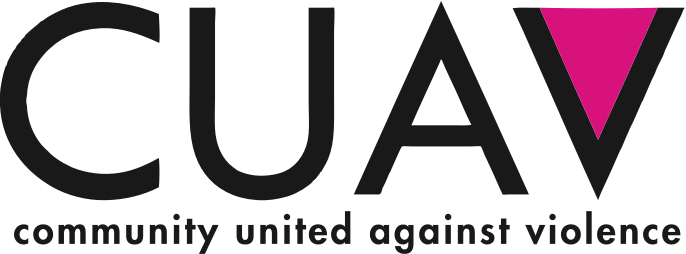A Love Note for Black Lives
To our Beloved Community,
CUAV continues to celebrate and honor Black Hxstory Month on this day of love! Our hope is that you join us in uplifting our national and international black community beyond the short twenty eight days recognized in the U.S. As we continue to refine and carry out our vision of building LGBTQI power, we are rooted in our values of creating black and brown unity. This means we deeply understand that this intentional work requires ongoing conversation, commitment and opportunities to center black wellness.
Black folks have not only achieved excellence but shaped the culture we know today. While achievement is often falsely linked to value, at CUAV we acknowledge black folks for resisting and surviving through many unique expressions of love, ritual, music, food, dance, play, pleasure, organizing, rallying, and breathing… There are many forms of strength equated to blackness and yet many barriers threaten the health and wellbeing of black lives. As our Black trans & gender non-conforming siblings continue to be impacted by all forms of violence at alarming rates, we encourage you to be an ally, co-conspirator* and advocate especially for our black LGBTQI family.
We invite our community members to join us in addressing anti-black racism within your respective organization, your extended community and own beating heart. The fight for systemic change often starts by looking within to understand how one’s actions, behaviors and beliefs impact others. On this Black Hxstory Month (…and beyond), we are called to be as committed emotionally, mentally, spiritually and physically towards the movement for black liberation.A ONE time action does not solve the root of any problem but consider sending reparations* or monetary investment to support the lives of black LGBTQI people.
We ask that you do one or more of the following:
Follow and donate to Black LGBTQI organization [i.e. Black Youth Project, TGI Justice Project (TGIJP), TAKE Resource Center, Trans Sistas of Color Project, Black Transwomen, INC, Black Queer and Intersectional Collective (BQIC)]
Send financial support directly to individual members of your community [Venmo, PayPal, cash]
Support CUAV’s mission to build black and brown unity by becoming a monthly sustainer
Lastly, we extend a warm invitation to Black LGBTQI survivors to join us for Take Care Tuesday starting on Tuesday, February 19th. This open support group is for all LGBTQI survivors of violence but we especially hold space for our black, indigenous and latinx members. The last group of this month will be centered around black unity, healing and joy.
On behalf of all staff members at CUAV, we see you and believe that your life is worth fighting for. Our success as an organization is associated to the direct impact we have on blackLGBTQI+ lives. Please contact us if you would like to hear more about our services. Feel free to reach out to Dominique at dominique@cuav.org to schedule an intake.
In healing and liberation,
The CUAV Team
Terms defined
*Co-conspirator
a person who is engaged in a conspiracy with another or others.
This term was also used by Alicia Garza, co-founder of Black Lives Matter who states “Co-conspiracy is about what we do in action, not just in language,” says Garza, “It is about moving through guilt and shame and recognizing that we did not create none of this stuff. And so what we are taking responsibility for is the power that we hold to transform our conditions” (Alicia Garza).
*Reparations
the making of amends for a wrong one has done, by paying money to or otherwise helping those who have been wronged. In a U.S. context, reparations are associated with the mass enslavement of African peoples. No monetary compensation has been provided to African- American families that have been deeply impacted from the traumatic effects that still leave undeniable marks on many generations today. These effects have shown up in many forms of oppression including but not limited to extreme poverty, lack of quality resources, education, housing, mental/ emotional health challenges, state violence.

